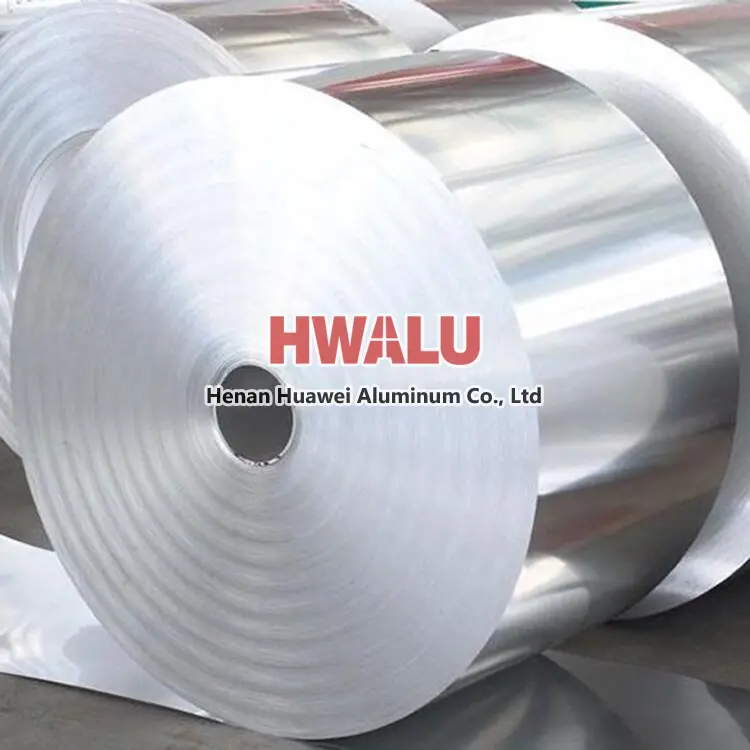What is aluminum foil jumbo roll? Aluminum foil jumbo roll refers to a wide continuous aluminum foil roll, usually with a width of more than 200mm. It is made of aluminum alloy material through rolling, cutting, grinding and other processes. Aluminum foil jumbo roll has the advantages of lightweight, strong plasticity, waterproof, corrosion resistance, heat insulation, etc., so it is widely used in many field ...
What is a lidding foil? Lidding foil, also known as lid foil or lid, is a thin sheet of aluminum or composite material used to seal containers such as cups, jars, and trays to protect the contents inside. Lidding foils come in a variety of shapes, sizes, and designs to suit different types of containers and packaging applications. They can be printed with branding, logos, and product information to enhance a ...
Honeycomb Aluminium foil Details Typical alloy 3003 5052 Temper O,H14, H16, H22, H24, O、H12、H14、H16、H18、H19、H22、H24、H26 Thickness (mm) 0.005-0.2 0.03-0.2 Width (mm) 20-2000 20-2000 Length (mm) Customized Treatment mill finish payment method LC/TT what is Honeycomb aluminum foil? Honeycomb aluminum foil has the advantages of light weight, high strengt ...
Countries and regions where HWALU aluminum foil is sold well Asia: China, Japan, India, Korea, Malaysia, Vietnam, Indonesia, Thailand, Philippines, Singapore, etc. North America: United States, Canada, Mexico, etc. Europe: Germany, UK, France, Italy, Netherlands, Poland, Spain, Sweden, Switzerland, etc. Oceania: Australia, New Zealand, etc. Central and South America: Brazil, A ...
Aluminum foil for flexible packaging Use 1235/1145 Aluminum foil for high temperature cooking food packaging 1235/1145 Aluminum foil for liquid food packaging 1235/1145 Aluminum foil for solid food packaging 1235/1145 Aluminum foil for pharmaceutical packaging Characteristic It has strong ductility and elongation characteristics and has good thermal stability, fewer pinholes, and good sha ...
Introduction of 8011 alloy aluminum foil 8011 alloy aluminum foil is added Al-Fe-Si elements, more than 1% of the total alloying elements in the corresponding performance of its alloy has a higher advantage, mainly for food packaging, and pharmaceutical packaging. Machinable range of thickness: 0.02mm-0.07mm, width 300mm-1100mm, can be customized according to customer needs. General parameters of aluminu ...
The biggest feature of aluminum foil is its light weight and wide range of uses, suitable for aviation, construction, decoration, industry and other industries. Aluminum is very cost-effective, and its electrical conductivity is second only to that of copper, but the price is much cheaper than that of copper, so many people now choose aluminum as the main material for wires. 1060, 3003, 5052 are several common ...
The thickness of aluminum foil for food packaging is generally between 0.015-0.03 mm. The exact thickness of aluminum foil you choose depends on the type of food being packaged and the desired shelf life. For food that needs to be stored for a long time, it is recommended to choose thicker aluminum foil, such as 0.02-0.03 mm, to provide better protection against oxygen, water, moisture and ultraviolet rays, th ...
▌ Make bananas last longer Like avocados, bananas can go from underripe to overripe in the blink of an eye. This is because bananas release a gas called ethylene to ripen, and the stem is where the most ethylene is released. One way to prevent bananas from ripening too quickly is to wrap a small piece of aluminum foil around the stem. ▌ Polishing chrome with aluminum foil It can be used in places ...
Why Can Aluminum Foil Conduct Electricity? Do you know how aluminum foil conducts electricity? Aluminum foil is a good conductor of electricity because it is made of aluminum, which has a high electrical conductivity. Electrical conductivity is the measure of how well a material conducts electricity. Materials with high electrical conductivity allow electricity to flow through them easily because they have many ...
The rolling oil and other oil stains remaining on the surface of the foil, which are formed on the foil surface to varying degrees after annealing, are called oil spots. The main reasons for oil spots: high degree of oil in aluminum foil rolling, or inappropriate distillation range of rolling oil; mechanical oil infiltration in aluminum foil rolling oil; improper annealing process; excessive oil on the surface ...
hot ingot rolling First, the aluminum melt is cast into a slab, and after homogenization, hot rolling, cold rolling, intermediate annealing and other processes, it is continued to be cold rolled into a sheet with a thickness of about 0.4~1.0 mm as a foil blank (casting → hot rolling billet → cold rolling → foil rolling). In the ingot hot rolling method, the hot rolled billet is first milled to remove defect ...










